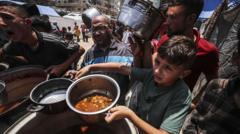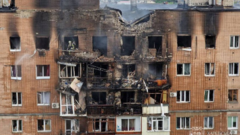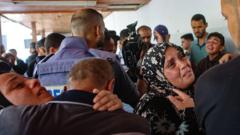In a tragic incident near a food aid distribution center in southern Gaza, Israeli gunfire resulted in the deaths of six Palestinians and injuries to several others. This latest escalation has prompted calls for a reassessment of the current humanitarian aid distribution model amidst ongoing tensions.
Six Palestinian Lives Lost Amid Tensions at Gaza Aid Distribution Site

Six Palestinian Lives Lost Amid Tensions at Gaza Aid Distribution Site
Latest violence near aid center in southern Gaza raises international scrutiny of Israel's humanitarian efforts.
In a grave incident reported by the Hamas-run Civil Defence agency, six Palestinians were killed and many others wounded as Israeli gunfire erupted near a food aid distribution center in southern Gaza. On Saturday morning, individuals had gathered to collect essential food supplies when gunfire began, according to an agency spokesperson. Eyewitness accounts suggest that Israeli forces opened fire as people attempted to move toward the site. Meanwhile, the Israeli military stated that warning shots were fired at individuals who approached them in a manner perceived as threatening.
This week has seen a surge of violence, with dozens of Palestinians reportedly killed and hundreds injured while trying to reach the distribution center. The US and Israeli-backed Gaza Humanitarian Foundation (GHF), which oversees the aid operations, announced a temporary pause in its activities to address overcrowding and enhance safety measures. However, individuals have consistently gathered at a nearby roundabout on the edge of an Israeli military zone that they must traverse to access the aid supplies.
The Israel Defense Forces (IDF) stated that residents had been warned that the area constitutes an active combat zone during nighttime hours. Compounding the situation, the GHF claimed that it was unable to distribute food on that Saturday due to alleged threats from Hamas, which the group has denied. This ongoing crisis is likely to intensify international condemnation of Israel's aid distribution strategy.
The United Nations has been vocal in its criticism of the new distribution model, asserting that it places Palestinians in peril and fails to sufficiently address the dire humanitarian needs in Gaza. Mahmoud Basal, spokesperson for the Civil Defence, also relayed reports that at least 15 other individuals had died from Israeli air strikes targeting a residential area in Gaza City, with reports suggesting some casualties remain trapped under the rubble.
In reaction, the Israeli army confirmed carrying out these strikes to eliminate a leader of the Mujahideen Brigades, a Palestinian militant group accused of engaging in the violence linked to the Hamas-led attacks on October 7, which resulted in approximately 1,200 fatalities and 251 individuals taken hostage. According to health ministry statistics from Gaza, at least 54,677 lives have been lost as a result of the ongoing conflict.
As Israel cautiously reinstates limited aid access after a prolonged blockade, the legitimacy of the GHF’s operational model, which seeks to bypass the UN, is facing increased scrutiny from humanitarian organizations that argue it is ineffective and unethical. The United Nations maintains it can track all humanitarian aid distributed, as concerns grow regarding the welfare of Palestinian civilians caught in the crossfire of an escalating war.





















